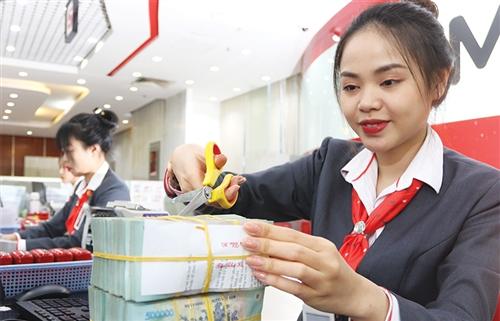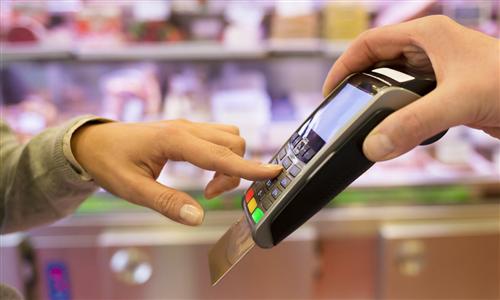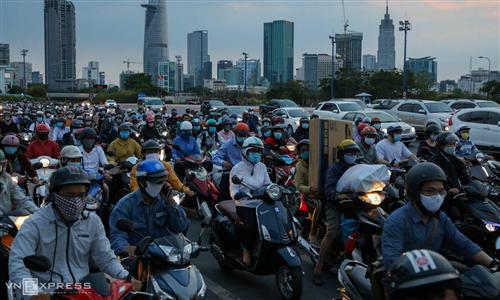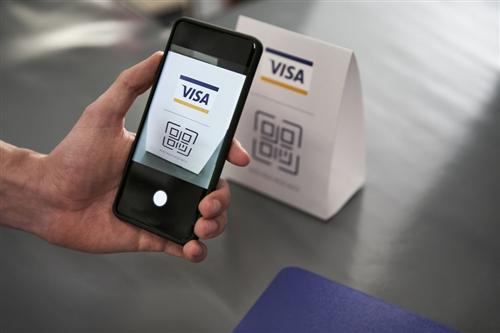Vietnamese consumers embrace cashless transactions amid COVID-19 pandemic
Vietnamese consumers embrace cashless transactions amid COVID-19 pandemic

Van, who lives in Thu Duc District, Ho Chi Minh City, told Tuoi Tre (Youth) newspaper that she has a habit of going to the market to buy fresh food in the morning.
However, since the first COVID-19 patients were reported in Vietnam in January, she has gradually switched to a personal shopper service that uses a mobile wallet, or e-wallet.
“I choose several items and make [online] payments. Then, I just stay home waiting for the delivery of my products, and process them,” she said, adding that she feels immensely relieved when she does not have to visit the market by herself.
She said she has been enjoying several benefits of digital wallet payments.
For example, she can pay her household electricity and water bills, thanks to a few clicks on an e-wallet platform. By doing so, her online account gets bonus points, and she receives vouchers from convenience and fast-food stores in return.
As Van refills her prepaid phone cards, she also gets discounts and earns more refunds on the purchase of SIM cards.
The COVID-19 pandemic has prompted a certain group of Vietnamese people to adopt online payment methods for the first time, according to Grab Vietnam.
Data from Moca, a strategic partner of the ride-hailing firm, revealed that the number of customers who conducted cashless transactions on the Grab platform for the first time in March ascended 22.5 percent against the previous month.
Non-cash transactions made up a staggering 43 percent of the total on Grab during the COVID-19 outbreak in Vietnam. The figure for its on-demand grocery service GrabMart amounted to some 70 percent.
Statistics from VisaNet, the electronic payments network of Visa, the world’s leader in digital payments, revealed that the value of purchases made by Vietnamese consumers on their Visa credit and debit cards in 2019 rose 39 percent against the previous year, while the number of transactions surged 54 percent over the same 12-month period.
Dang Tuyet Dung, Visa country manager for Vietnam and Laos, said the study has shown an increased preference for new payment technologies such as contactless, where a user simply taps their card, phone, or wearable device against a point-of-sale (POS) terminal.
As many as 37 percent of consumers are using contactless card payments in Vietnam, while an even higher number of 42 percent are making mobile contactless payments. Of those using contactless card payments, 85 percent are doing so at least once a week.
The study also found other new technologies are garnering interest among consumers with 82 percent saying they are interested in making biometrically authenticated payments, by using their fingerprint or voice recognition to complete a transaction, while 81 percent are keen on digital banking.
Banks strive to gain foothold in e-commerce
Nguyen Minh Tam, deputy general director at Saigon Thuong Tin Commercial Bank, or Sacombank, said despite the ongoing pandemic, card payment sales at his bank between January and April this year grew 15 percent from a year earlier to reach 35 percent.
In contrast, POS transactions, especially those international deals, at the bank’s local counters suffered a steep decline, according to Tam.
He said the virus crisis has led to an upsurge in e-payments. Many households have become increasingly interested in online shopping, notably during the social distancing campaign which ended last month.
Contactless payments also enjoyed a substantial increase in growth. “The number of transactions through the mBanking and Sacombank Pay apps has greatly grown,” he said.
He added Sacombank has launched a host of cashback and incentive schemes, such as lucky draws and reductions in service fees, in an attempt to bolster cashless transactions.
Internet banking transactions at Ho Chi Minh City Development Joint Stock Commercial Bank, or HDBank, in the first quarter of this year went up 112 percent, according to the bank’s deputy general director Nguyen Huu Dang.
Dang said the number of new customers using cards soared 67 percent over the same period last year.
“Aside from technology, those customers who make cashless transactions at HDBank will benefit from an ecosystem where they will get incentives in card payments whenever they purchase goods at electronics supermarkets, Vietjet Air tickets, and essential goods at the Saigon Co.op chain,” he said.
Vietnam records 30 million daily online transactions
Pham Tien Dung, general director of the Payment Department at the State Bank of Vietnam, told Tuoi Tre that there have been investments in and upgrades to technical infrastructure and technologies designated for cashless transactions, particularly online payments.
As of February this year, a total of 78 banks and financial institutions offered Internet banking services while 47 organizations provided mobile payment services in Vietnam.
Dung cited statistics of the Vietnamese central bank as indicating that last month saw around 15 million users of Internet banking and mobile banking services, as the government took social distancing measures to curb the spread of the novel coronavirus between April 1 and 22.
The country had a daily average of around 30 million online transactions, he commented.
“If someone has used e-payments for their electricity and phone bills on their mobile phones, I think no one will want to pay in cash anymore,” he said.
Cashless transactions, why not?
Taking the statistics on cashless transactions into account, Nguyen Tri Hieu, a banking and financial expert who have worked in the United States, Germany, and Vietnam for more than three decades, said the e-payment industry in Vietnam has grown rapidly as there are a wide range of payment methods to satisfy the public’s needs.
However, cash is unlikely to go away soon.
Paper currency remains the most popular way to pay for trivial things, such as for food, motorbike taxi rides and gasoline, or valuable assets, like cars and land.
Pham Quang De, a banking technology expert, stressed the need for more convenience for customers, especially the elderly.
Once people get out of this habit, he said, they will recognize the benefits and convenience of non-cash transactions.
Regarding electronic paying, people can open banking accounts that allow easy payments with a few clicks on their device, according to the expert.
Pham Tien Dung from the central bank said that the cash payment habit poses the largest obstacle to the cashless economy.
However, according to the official, the services involved should be diverse.
Banks should partner with stakeholders in electricity and water providers, hospitals and schools, among others, to foster a cashless ecosystem.











